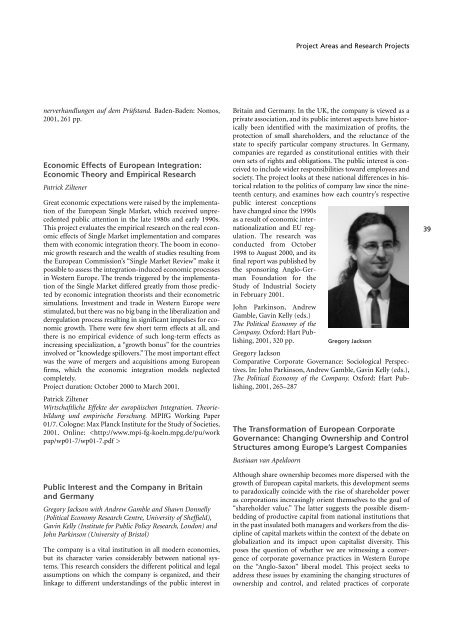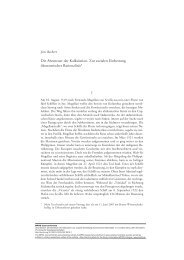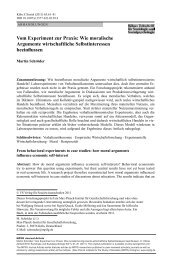Publications - MPIfG
Publications - MPIfG
Publications - MPIfG
You also want an ePaper? Increase the reach of your titles
YUMPU automatically turns print PDFs into web optimized ePapers that Google loves.
nerverhandlungen auf dem Prüfstand. Baden-Baden: Nomos,<br />
2001, 261 pp.<br />
Economic Effects of European Integration:<br />
Economic Theory and Empirical Research<br />
Patrick Ziltener<br />
Great economic expectations were raised by the implementation<br />
of the European Single Market, which received unprecedented<br />
public attention in the late 1980s and early 1990s.<br />
This project evaluates the empirical research on the real economic<br />
effects of Single Market implementation and compares<br />
them with economic integration theory. The boom in economic<br />
growth research and the wealth of studies resulting from<br />
the European Commission’s “Single Market Review” make it<br />
possible to assess the integration-induced economic processes<br />
in Western Europe. The trends triggered by the implementation<br />
of the Single Market differed greatly from those predicted<br />
by economic integration theorists and their econometric<br />
simulations. Investment and trade in Western Europe were<br />
stimulated, but there was no big bang in the liberalization and<br />
deregulation process resulting in significant impulses for economic<br />
growth. There were few short term effects at all, and<br />
there is no empirical evidence of such long-term effects as<br />
increasing specialization, a “growth bonus” for the countries<br />
involved or “knowledge spillovers.” The most important effect<br />
was the wave of mergers and acquisitions among European<br />
firms, which the economic integration models neglected<br />
completely.<br />
Project duration: October 2000 to March 2001.<br />
Patrick Ziltener<br />
Wirtschaftliche Effekte der europäischen Integration. Theoriebildung<br />
und empirische Forschung. <strong>MPIfG</strong> Working Paper<br />
01/7. Cologne: Max Planck Institute for the Study of Societies,<br />
2001. Online: <br />
Public Interest and the Company in Britain<br />
and Germany<br />
Gregory Jackson with Andrew Gamble and Shawn Donnelly<br />
(Political Economy Research Centre, University of Sheffield),<br />
Gavin Kelly (Institute for Public Policy Research, London) and<br />
John Parkinson (University of Bristol)<br />
The company is a vital institution in all modern economies,<br />
but its character varies considerably between national systems.<br />
This research considers the different political and legal<br />
assumptions on which the company is organized, and their<br />
linkage to different understandings of the public interest in<br />
Britain and Germany. In the UK, the company is viewed as a<br />
private association, and its public interest aspects have historically<br />
been identified with the maximization of profits, the<br />
protection of small shareholders, and the reluctance of the<br />
state to specify particular company structures. In Germany,<br />
companies are regarded as constitutional entities with their<br />
own sets of rights and obligations. The public interest is conceived<br />
to include wider responsibilities toward employees and<br />
society. The project looks at these national differences in historical<br />
relation to the politics of company law since the nineteenth<br />
century, and examines how each country’s respective<br />
public interest conceptions<br />
have changed since the 1990s<br />
as a result of economic internationalization<br />
and EU regulation.<br />
The research was<br />
conducted from October<br />
1998 to August 2000, and its<br />
final report was published by<br />
the sponsoring Anglo-German<br />
Foundation for the<br />
Study of Industrial Society<br />
in February 2001.<br />
John Parkinson, Andrew<br />
Gamble, Gavin Kelly (eds.)<br />
The Political Economy of the<br />
Company. Oxford: Hart Publishing,<br />
2001, 320 pp.<br />
Gregory Jackson<br />
Gregory Jackson<br />
Comparative Corporate Governance: Sociological Perspectives.<br />
In: John Parkinson, Andrew Gamble, Gavin Kelly (eds.),<br />
The Political Economy of the Company. Oxford: Hart Publishing,<br />
2001, 265–287<br />
The Transformation of European Corporate<br />
Governance: Changing Ownership and Control<br />
Structures among Europe’s Largest Companies<br />
Bastiaan van Apeldoorn<br />
Project Areas and Research Projects<br />
Although share ownership becomes more dispersed with the<br />
growth of European capital markets, this development seems<br />
to paradoxically coincide with the rise of shareholder power<br />
as corporations increasingly orient themselves to the goal of<br />
“shareholder value.” The latter suggests the possible disembedding<br />
of productive capital from national institutions that<br />
in the past insulated both managers and workers from the discipline<br />
of capital markets within the context of the debate on<br />
globalization and its impact upon capitalist diversity. This<br />
poses the question of whether we are witnessing a convergence<br />
of corporate governance practices in Western Europe<br />
on the “Anglo-Saxon” liberal model. This project seeks to<br />
address these issues by examining the changing structures of<br />
ownership and control, and related practices of corporate<br />
39

















